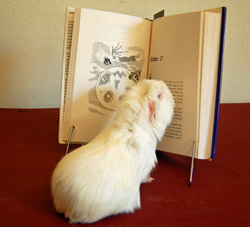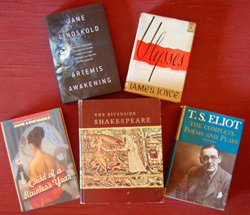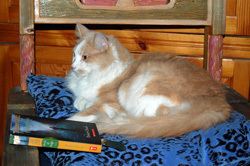Jane Lindskold's Blog, page 129
January 23, 2015
FF: Lost in Print (and Audio)
This past week, I spent a lot of time in the kitchen, figuring out what would go into what cabinet.�� That gave me a bit more time with recorded books.�� I rewarded myself with one day when I let myself read without watching the clock.�� Bliss!

Ready to Read!
So what exactly are the Friday Fragments? The FF feature lists of what I���ve read over the past week.�� They are not meant to be a recommendation list.�� If you���re interested in a not-at-all-inclusive list, you can look on my website.
This is not a book review column.�� It���s just a list with, maybe, a few opinions tossed in.
Recently Completed:
The Book of Kells by R.A. MacAvoy.�� Set in Ireland something over a 1,000 years ago, the plot intertwines with intricate historical detail much like the Celtic knotwork of the title.�� I found myself tangled up in historical details in the middle, but enjoyed the book a great deal.
The Museum of Thieves by Lian Tanner.�� Audiobook.�� Middle grade.�� In a city where protecting the children from any and all dangers has become the excuse for an increasingly dictatorial regime, the greatest thing one can steal is oneself.
Chobits.�� Manga.�� The complete series.�� Interesting tale that starts out looking like a romantic comedy and evolves into a meditation on identity, the nature of relationships (including ���mere��� friendship), and love.�� In these days where Social Media is coming to dominate so many people���s lives, even more timely than when first written.
In Progress:
Tamsin by Peter Beagle.�� Audiobook.�� Read by Peter Beagle.�� The first part of the book could be any book about a major life transition but Beagle is so good that his rather whiny narrator (who knows she���s whiny) still held me.�� I���ve just gotten to the ghost.
Annihilation by Jeff Vandermeer.�� Just started.
Also:
Isn���t this enough?�� �� My to-be-read shelf is crammed, but I���d love to know what you���re reading.�� There���s always room for more.

January 22, 2015
TT: Moving with Cats
JANE: Last week, we were talking about things you found difficult to live without when you and Robin moved.�� Noticeably omitted were your cats, Harpo and Bess.
When you moved house did you bring the cats with you in the car?

Kwahe’e Contemplates Travel
ALAN: No, definitely not. The cats both hate car journeys (I think they associate the car with visits to the vet). Harpo howls and Bess shivers with fear. Both sets of symptoms are unpleasant and upsetting, so there was no way I was going to put either them or us through the trauma of a 300 km journey.
JANE: So what did you do?
ALAN: About a week before we moved, we put the cats in the local cattery. They don’t like it, but at least it’s familiar ��� they’ve been there many times before. Then we started packing up the house, something else that would have upset them if they’d seen it.
JANE: How did you get them from the cattery to the new house?
ALAN: There’s an organisation called VenturePets who, for an inordinately large fee, will transport and deliver your pets door to door. So once we’d got the majority of our furniture unpacked and ready for the cats, VenturePets picked them up from the cattery, flew them on a commercial flight to the nearest airport, picked them up when they landed, and delivered them to us. The lady in the cattery sent me an email when they were picked up and she told us that Harpo howled all the way down the driveway to the van.
JANE: I know that when my mom has flown with her cat, she���s been required to have it tranquilized.�� Were Harpo and Bess cats tranquilized?
ALAN: No ��� VenturePets doesn’t believe in drugging the animals they transport. And a vet friend of mine tells me that the practice of tranquilising animals under these circumstances is much more for the benefit of the owners than it is for the benefit of the animals!
JANE: I presume they both arrived safely?
ALAN: Yes. The lady who delivered them to us told us that Harpo howled at the top of his voice all the way from the airport to our house. She sang nursery rhymes to him to try and make him feel better. But it didn’t work.
JANE: Maybe she didn’t sing them very well.�� Or maybe he would have preferred folk or filk���
ALAN: No, I think he’s more of a jazz fan…
Have you ever moved with your cats? How did they (and you) cope with the trauma?
JANE: I���ve moved with my cats several times.�� The first time was from New York to Virginia, the second from Virginia to New Mexico.�� Maybe because I used house call vets for routine care back when I lived in both New York and Virginia, my cats didn���t react too badly to car trips.�� Well, I should probably qualify that.�� I did have one cat, Gwydion, who reacted badly.�� Precisely forty-five minutes into any car trip, he would get carsick.
ALAN: How did you figure out the timing?
JANE: Back when I lived in Virginia and needed to drive to New York, I���d make the trip via my mom���s place in Maryland.�� The cats (who loved my mom) would then go stay with her for a few days.�� The first time we made this trip, Gwydion threw up.�� Usually, I���d have brought a roll of paper towels, but I didn���t have them.�� However, there was a roadside stop just down the way, and we solved the problem, cleaned Gwydion up, and finished the trip without further incident.
The next time we made the trip, at exactly the same point, he threw up again.�� With the store as a landmark, I then calculated back to past trips and realized that we had a pattern.
Eventually, we made good friends in Virginia who would cat sit when we travelled, so this wasn���t a problem until the day I left for New Mexico from Virginia.�� I didn���t take much when I left, shipped my books ahead, and only took my six cats and a few things that I wouldn���t trust to shippers with me in the car.
ALAN: How far apart are New Mexico and Virginia? Don’t answer that ��� I haven’t unpacked my atlases yet, but I do have an internet connection…
(Alan goes googling…)
Gosh! That���s a really long drive.�� You certainly couldn���t do it in one day.
JANE: No, I couldn���t.�� What I did was drive as far as North Carolina to meet Roger, who had flown from New Mexico, so he could share the trip.�� This was a several hour drive, so by the time we got there, Gwydion had already done his throwing up for the day.
The cats and I collected Roger, and we drove west until we couldn���t take it anymore. Then we found a motel that would accept pets.
Now, Roger had been diagnosed with cancer by this time.�� He was seeing an alternative medical practitioner who was doing a good job in helping him manage the side effects of the chemo drugs.�� He���d mentioned our plans to her, including that Gwydion got car sick.�� She gave him a tiny bottle of a homeopathic remedy called something like Be Still.�� We were to give Gwydion a few drops orally, then renew ��� I think mid-day, but it���s been nearly twenty years, so I don���t remember the exact timing ��� by placing a few drops on the fur between his ears.
ALAN: Did it work?
JANE: To my complete and utter astonishment, it did.�� By then, Gwydion was about eight years old and his pattern was firmly established.�� But with this treatment, he didn���t throw up.�� Nor was he dopey or drugged.�� Because of his problems, I���d positioned his carrier so that I could reach him from the front seat, so I could see him easily.�� He was calm, bright-eyed and alert.
ALAN: In some ways I’m not surprised it worked. My late cat Porgy (the Best Cat Ever) had several serious illnesses during his short life and he was very stressed as a result. The vet recommended something similar to us. We didn’t anoint him with it though, we put it in a gadget which had a heating element that vapourised it. The fumes (said the vet) contained calming pheromones. Initially I was sceptical, but it definitely worked and it helped him a lot.
Rather like your Gwydion, my Bess is a vomiting cat. She generally throws up after breakfast and after dinner because she’s greedy and gobbles her food too fast. Once I had a long and illuminating discussion about cat vomit with the checkout lady at the supermarket who was interested in the brand of cat food I was buying. Isn’t it amazing what subjects break the conversational ice and lead to a lifetime’s friendship?
JANE: Yes, it is����� I have a couple more tales about travelling with cats I���d like to share. I���d also love to hear how Harpo and Bess settled into their new abode.�� However, my current crew are asking me to pay attention to them, I���ll leave my stories until next time.

January 21, 2015
Lustrum Review
Those of you who have read my novels, Changer and Changer���s Daughter (aka Legends Walking),know that once every five years, the immortal athanor gather to catch up both on business and with old (in some cases, very, very old) friends.�� These meetings are called lustrum reviews ����� lustrum being a period of five years, as a decade is ten.

Five years!!!
Five years ago, I started writing the Wednesday Wanderings.�� Since then, the same site has come to include the Thursday Tangents (co-written with award-winning New Zealand reviewer, Alan Robson) and, just this past year, the Friday Fragments, an informal look at what I���ve read the previous week.
The Wednesday Wanderings are also directly responsible for my most recent book, the non-fiction, Wanderings on Writing, which is a collection of and expansion upon those pieces I���ve written about the art and craft of writing ��� with a bit of advice about how to fit writing into your day-to-day routine added in for good measure.
The Wednesday Wanderings are the best place to learn what���s going on in the world of Jane Lindskold.�� Not only will you find out about evolving projects, release dates, appearances, reviews, and contests, you���ll also get a look behind the scenes at how stories evolve, since very often some issue related to what I���m working on at a given moment triggers that week���s essay.
I���ll also talk about other stuff, completely unrelated to writing, like my garden, craft projects, and role-playing game.
Sometimes I bring questions to the readers of the Wednesday Wandering, such as last February���s discussion of what should the title be for the second book in my ���Artemis Awakening��� series.�� The final decision ��� Artemis Invaded (due for release June of 2015) was directly influenced by reader feedback.
Another area where the readers of the Wednesday Wanderings were able to provide valuable feedback was regarding whether I should put some time into a re-release of one of my out-of-print novels, or put together a short story collection.�� The short story collection ���won��� resoundingly, and is now over half-completed, including ��� at your request ��� original afterpieces about each story.
Reader comments sometimes provide the seed that grows into a later Wednesday Wandering column.�� A recent example is ���What English Professors Love��� (WW 1-07-15), which grew out of a question asked by Chad Merkely.�� I welcome questions, as well as suggestions as to topics you might enjoy hearing about.
Too shy to comment on the site?�� An e-mail to jane2@janelindskold.com will reach me.�� Your ghosthood will be respected!
Yes.�� I do post to Twitter but, if you���re looking for more than a quick news flash, the Wednesday Wanderings are the place to be.
This coming year, there���s a lot to look forward to����� In addition to the promised short fiction collection, there will be the release of Artemis Awakening in mass market paperback, Artemis Invaded in hard cover (and e-book), and several new short stories.
I���m also planning to expand the author interview series I started late last year, so that every month or so, without ever going anywhere else, you���ll be able to ���meet��� other authors and hear about their works.�� My promise to myself and my guests is that I���ll try to come up with unusual questions, firmly based in their works, rather than the generic one-size fits all so common on the web.
And, of course, you���ll be among the first to learn about new developments.
Over five years, the Wednesday Wanderings community has expanded into a friendly, interesting place to be.�� Whether you���re a new arrival or a regular reader, I hope you���ll not only hang around, but invite your friends to join us!

January 16, 2015
FF: Back to Books
The proofs for Artemis Awakening in mass market are in, the kitchen mostly done. Just a reminder, since there seems to be some confusion.�� Artemis Awakening is currently available in hard cover and ebook.�� The sequel, Artemis Invaded will be out in June of 2015.
So what exactly are the Friday Fragments? The FF feature lists of what I���ve read over the past week.�� They are not meant to be a recommendation list.�� If you���re interested in a not-at-all-inclusive list, you can look on my website.
This is not a book review column.�� It���s just a list with, maybe, a few opinions tossed in.
Recently Completed:

Construction Supervisor
Brothers in Arms by Lois McMaster Bujold. ��Audiobook.�� Miles��� gets to Earth but ��� between terrorists and intrigue ��� doesn���t see much of it.�� Good expansion of the complicated politics that are crucial to this series.
The Other Inheritance by Rebecca Jaycox.�� Reggie���s dad is from the Other.�� Reggie is the last user of a very, very powerful form of magic.
In Progress:
The Book of Kells by R.A. MacAvoy.�� Set in Ireland something over a 1,000 years ago, the plot intertwines with intricate historical detail much like the Celtic knotwork of the title.
The Museum of Thieves by Lian Tanner.�� Audiobook.�� Middle grade.�� Just started.
Also:
Reassembling my kitchen, a process at least as twisted and complex as MacAvoy���s novel.

January 15, 2015
TT: Things You Can’t Live Without
JANE: So, Alan, a few weeks ago, when you and Robin set forth for your new home, you mentioned that you���d discovered a few things ��� in which you included services ��� that were very hard to get along without.
ALAN: Ah yes ��� now thereby hangs a tale…

Vital Necessities
The plan was that we’d travel up to our new house and we’d have a couple of days before our stuff arrived so that we could decide where everything ought to go. That’s fine in theory of course. But in practice it meant we actually had a few days without any stuff at all. In retrospect, perhaps it wasn’t the wisest decision we’ve ever made.
JANE: Before your stuff arrived??�� Where did you sleep?�� Did you stay in a motel?�� Use sleeping bags?
ALAN: Ah, we had that covered. Just before we set off we bought an air bed and a pump and we packed some sheets and pillows to bring with us as well. Also, Robin decided that since we were moving to a new house, we obviously needed a new bed which meant that our current bed could be a spare for visitors. So one of the big plans was to go out and buy a bed before our stuff arrived.
JANE:�� Ooh����� I have very mixed feelings about those air beds.�� They���re great in theory, but not so much in practice.�� For one, if it���s at all cold (which given that it���s summer there, wouldn���t have been a problem for you), they can get very cold, because the air doesn���t retain body heat the way a regular mattress does.
They also have a tendency to develop slow leaks.�� Jim and I both remember a trip we took where our host put us on an air bed that, by morning, had us sleeping on the carpet.�� It was not a very thick carpet either���
How has your experience been?
ALAN: Our experience has been just like yours ��� and we are still having all these problems today. You see, we bought and paid for a magnificently comfortable and enormously large bed. Then we learned that the mattresses are all made to order, so we’d have to wait for some time before we could actually sleep on it. We’re still waiting. We’ve been here more than a month now and we’re still sleeping on the air bed on the floor. And that’s likely to continue for a few weeks yet. So I can truly say that one of the things it’s very hard to get along without is a bed. These old bones ache in the morning after a night on a rather squishy air bed.
JANE: But you said above that you kept your old bed to be used by visitors.�� Surely it didn���t take a month to arrive.�� Couldn���t you have used that?
ALAN: I suppose we could ��� but we didn’t want the cats to think that the spare bedroom was actually our bedroom. We wanted them to realise just where we (and they) were supposed to spend the night right from the start. Also, we had guests just after Christmas, so we’d have had to use the air bed for ourselves while they were here. You can’t expect guests to sleep in discomfort ��� and anyway, one of our guests has just had an operation on her foot and she isn’t physically capable of getting on and off something as low down as an air bed. So we really didn’t have any choice.
JANE: Well, that makes sense.�� Very kind of you, too.�� ��In anticipation of our recent kitchen remodel (cabinets and counters), Jim and I carefully packed away cooking tools in order of our likelihood of needing them.�� The final step was putting a small selection of dishes and pots in a box so we could get to them as needed.�� We weren���t having any appliances replaced, so we could more or less eat normally.
Or that was the plan.�� On Day One, they pulled out the appliances to get at things behind them, so we ended up going out for dinner.�� How did you handle eating?
ALAN: Eating was easy. We just went out for breakfast, lunch, and dinner. It’s not the cheapest way to live, but on the plus side, we did find some lovely restaurants that we intend to go back to if we ever get rich again. Also I made sure to hide the coffee pot and some coffee before the moving men arrived to pack up the old house. Robin and I are both coffee addicts and the thought of several days without coffee was more than we could bear. Unfortunately I forgot to pack any mugs and spoons.
JANE: Oh, dear����� I���m also a coffee addict and I can���t imagine what I would do without my beloved Joe.�� What did you do?
ALAN: All was not lost. At the last minute, the moving men asked me if I wanted them to pack the dirty crockery in the sink. That’s when I realised what I’d done (or, more accurately, what I’d not done) and I rescued two mugs and a teaspoon from them. So when we arrived at the new house, the first thing I did was the washing up!
Then I made coffee.
JANE: That���s great!�� And very appropriate.
How did you feel about going without an internet connection for several days?�� I know I felt severe withdrawal symptoms during those days I knew I couldn���t ���talk��� with you.�� However, I could assuage my loss by communicating with other people.�� You were cut off entirely.�� Going ���unplugged��� for a day or so each week is becoming trendy here in the U.S.�� How did you feel about it?
ALAN: Going cold turkey on my internet connectivity was actually the hardest thing of all to do without. As Joni Mitchell sang:
���…you don’t know what you’ve lost ’till it’s gone.���
I hadn’t realised just how much I depended on being connected to the world. In moments of desperation, when the withdrawal symptoms got to be too much to bear, I could use the data connection on my phone to check web pages and send short emails, but I really don’t like doing that. The screen on the phone is too tiny and the keyboard is impossible to use when you’re a ten-fingered touch typist. And anyway, my data allowance is small, and the charges become very expensive after I’ve used the basic allowance up.
I’m starting to think that internet connectivity should be a basic human right along with power and clean water.
JANE: Is it really that pervasive in your life?
ALAN: Yes it is; I use the internet for pretty much everything ��� all the way from trivial things like checking the daily news through to more important things like paying my bills. I haven’t received a paper bill in the mail, or paid a bill with a cheque, for several years now. Every single financial transaction that I make is electronic these days.
JANE: I wish I felt that confident about internet security!�� However, we have the same options here and I know many people who do all their business on the net.�� I do just about all my business this way but, in the end, I find I like human contact, too.
And until cats and guinea pigs can type, some of my best buddies are going to be off-line.
Speaking of which, I���d love to hear how Harpo and Bess took the move. ��Maybe next time!

January 14, 2015
Unreadably New? Boringly Formulaic?
The Comments to last week���s WW wandered (as well they should) onto the subject of why so many early twentieth century artistic works ��� in which literature, music, and visual arts were all included ��� became so stylized as to be enjoyed by a limited group, often, but not always, made up of those who were specialists in that particular field.

Formula
This contributed to a split between popular culture and ���unpopular��� Culture that remains to the current day���although, as heteromeles noted, very amusingly, some of the techniques of ��Culture have been borrowed by pop culture to very interesting effect.
This got me thinking about which side of the division I come down on ��� at least in regard to SF/F, a field in which I both write and read.
As a long-time reader of SF/F, there are certain books I read which ��� while not bad in and of themselves ��� simply stick too close to formula to provide me with much pleasure.�� Therefore, if they have any weaknesses at all, those weaknesses stick out, leaving me feeling worse about the book than I might have if the same weaknesses had appeared in a less formulaic piece.
Basically, I don���t much care for a novel where I can inform Jim, as I have from time to time: ���Okay.�� Here���s what���s going to happen, in this order.����� I really dislike books where characters seem churned off a template ��� something that happens all too often when a writer is either trying to catch hold of a trend or writing his/her variation on some story he or she loved deeply.
Formulaic settings, especially those that use elements drawn from some other work ��� whether Tolkien or the latest video game or some movie ��� also annoy me, especially since the further from the source material the work gets,�� the less reasonable the combinations.
Does this mean I love innovative works?�� No, not automatically, especially if I can ���see��� the author doing a variation on the Joycean ���look at me��� that I mentioned in last week���s piece.�� Literary special effects don���t impress me unless they serve the story.�� Otherwise, they���re just as much of a yawn ��� and frequently more annoying ��� than formulaic fiction.
The annoying factor in innovative works was well-illustrated by the New Wave SF/F ���movement��� some decades ago.�� Since Alan and I discussed this in a Tangent back in 2013, I won���t repeat myself. [insert link]�� I���ll just add that please don���t expect to impress me by inventing a new word or pronoun or inverted narrative style or using weird fonts.�� Been there, done that, rode that pony.�� Innovation is when these things serve the story, rather than the story being a Christmas tree on which FX lights have been strung.
When I started reading SF/F, there were a lot of magazines serving the genre ��� and this was way down from a couple decades earlier.�� Now there are hardly any, yet SF/F has never been more in the popular eye.�� My personal opinion is that the magazines began to serve not the wider readership but the narrower one that nominated for awards.�� In doing so, they lost the audience who wanted a good, ripping yarn.�� They might have won the battle of getting some SF/F recognized as Literature, but they lost their readership.�� A Pyrrhic victory, indeed.
Yet is formulaic completely horrible?�� Is new and innovative completely great?
I really don���t think the question is so simple.�� Formulaic fiction is most often attractive to those new to the genre.�� There was a series a few years back ��� I won���t name the titles, since I haven���t read the series in full myself ��� that sold amazingly well, despite the fact that just about every element in the books was transparently cut and pasted from popular movies and books of the previous decade.�� A young cousin of mine was in love with these books but, when we talked about them, he admitted he���d never read any Fantasy before, so what was derivative in the extreme to me, was new and fresh to him.
As an aside, I���ll note that there seems to be a serious glut of retold fairytales out there ��� in prose, graphic novels, on television, and even in ���fashion dolls.����� So clearly the audience for the familiar story is alive and well.
I can take pleasure in a book that has elements of formula, if the author does something fresh within the formula.�� The easiest way to grab me is with a character or set of characters I get attached to.�� Next comes an innovative setting.�� Both will keep me going through some variation of ���Character discovers he/she is the Powerful One everyone has been Waiting to Save the World.���
I���ll admit, probably because writing is my craft, innovative storytelling techniques that serve the story excite me a lot.�� A couple years ago, a friend suggested I try YA author A.S. King.�� I did.�� Her Please Ignore Vera Dietz blew me away. I���ll admit, while I told Jim I liked it, I didn���t press him to read it, because I wasn���t sure he���d like the style.
Recently, I read A.S. King���s Glory O���Brien���s History of the Future and was, again, impressed by how the narrative tricks served the story.�� But reading her books isn���t easy ��� and not just because (at least in these two examples) her main characters begin depressive.�� I couldn���t sit and read a string of her novels in a row, any more than I���d down a bunch of cups of espresso in one sitting ��� at least not if I expected to sleep without my head buzzing in circles.
So, which side do I come down on?�� Probably slightly in favor of innovation.�� There���s a reason I don���t read Romance novels.�� A variation on the same story doesn���t interest me.�� However, I���ll take a good story with not a single bell or whistle over a dull story slumming in fancy prose.
Which way does the balance between the two tilt for you?

January 9, 2015
FF: Too Busy Even to Read
Since last the last Friday Fragments, we have lost a beloved pet and had our kitchen torn to shreds for remodeling of cabinets and counters that is on-going as I write.�� Add to this that I really, really, really had to finish the proofs for the mass market edition of Artemis Awakening and I haven���t had much time to read.
Wondering what the FF is about?�� (At least most of the time?)�� The Friday Fragments feature lists of what I���ve read over the past week.�� They are not meant to be a recommendation list.�� If you���re interested in a not-at-all-inclusive list, you can look on my website.

RIP Snowdrop
This is not a book review column.�� It���s just a list with, maybe, a few opinions tossed in.
Recently Completed:
Cetaganda by Lois McMaster Bujold.�� Audiobook. ��Any novel where one of the on-going elements is ���Why is the Main Character Even Involved in this Story?��� has an integral weakness.�� Despite this, I enjoyed, especially the Cetagandan world-building.
In Progress:
Brothers in Arms by Lois McMaster Bujold.�� Audiobook.�� Barely into it���
The Other Inheritance by Rebecca Jaycox.
Also:
Several magazine articles since my stack was getting unwieldy.

January 8, 2015
TT: Filking Away the Hours
JANE: Well, Alan, a few weeks ago, before the holidays sent us Tangenting off in other directions, we promised we would discuss filk music.�� Since I had never heard of filk before Roger Zelazny introduced me to it as part of his cheerful campaign to introduce me to SF/F fandom (something I knew little or nothing about ��� that���s another story entirely), I think I���d like to offer a definition for those of our readers who may be similarly ignorant.

Filk Collections
ALAN: Definitions are good. Tell me what yours is.
JANE: Filk music is, more or less, folk music with SF/F themes.
I read that the word ���filk��� originated as a typo in a convention program where a folk music sing-along was part of the late night programming.�� The word stuck, since it gave a name to the somewhat different playlist.
ALAN: Not bad ��� though I’d quibble slightly about restricting it to folk music derivations. These days pretty much any song or musical style seems to be grist to the filking mill.
JANE:�� I���ll take your word for it.�� I haven���t ever attended a filking session.�� Most of my experience has been with recordings.
Sometimes filk is very good.�� Sometimes, well����� I don���t have the source anymore, but years ago I read a comment credited to author Marion Zimmer Bradley about filk: ���Filk is like sex.�� It should be performed by consenting adults in rooms with closed doors.���
ALAN: I agree with her!
JANE: Whatever the case, like sex, filk remains very popular.�� Most U.S. conventions have a filk track.�� Some even have filk Guests of Honor, along with Author, Artist, and Fan Guests of Honor.
Is filk popular in England?�� How about in Australia and New Zealand?
ALAN: Yes ��� it’s very popular and most conventions have both formal and informal filking sessions. I tend to avoid them, but that’s just me.
JANE:�� Why do you avoid them?
ALAN: We have at least two extremely talented filkers here in NZ. Unfortunately we have about 200 extremely untalented ones, so I find most filk sessions quite painful.
JANE: Untalented?
ALAN: Far too many of them seem to have no metrical sense. They can’t count syllables, and they don’t know how to stress the words properly. They do understand rhyme (it’s almost impossible not to understand rhyme), but all too often that just means that their songs are full of place holders ��� lines whose only purpose is to provide a rhyme, but which add nothing to the sense of the piece. So the whole thing just makes me cringe with embarrassment.
JANE: You did say you have some talented filkers, so things can’t be all bad.
ALAN: Oh indeed. When Star Trek: The Next Generation first appeared on our TV screens, a lot of people hated the character Wes Crusher. One of our filkers wrote a brilliant song called ���50 Ways To Kill Wes Crusher.��� Obviously it was sung to the Paul Simon tune ���50 Ways To Leave Your Lover.��� It was both clever and very funny.
Several years after I first heard the song, I was running a course at a client’s site. I arrived to set up the computers that we’d need but I was told I couldn’t set up yet because the social club was having a lunch time meeting and they were using the room. Fair enough. I went and grabbed a coffee.
Eventually the social club meeting finished and I went into the room to start doing my stuff. I was pleased to see that the social club had obviously been having a sing-song. They’d left some song sheets behind. They’d been singing ���50 Ways To Kill Wes Crusher���…
JANE: And so the virus spreads���
Roger loved folk music, so he was interested in filk, since it combined two of his loves: SF/F and folk.�� At one point, he sent me a bunch of cassette tapes that produced by something called ���Bayfilk.����� They contained a wide selection of pieces ��� some of which seemed more or less straight ���folk��� to me, others of which were clearly SF/F inspired.
My impression ��� and I���d love if our readers would step in and clarify for me, since I���m not familiar enough with folk music to be sure ��� is that many U.S. SF/F filk pieces were/are original compositions, rather than relying on someone else���s music.
ALAN: I can’t comment about U.S. filking because I have no experience of it, but here we tend more towards setting new words to well-known tunes. That can be pleasing on two levels, of course. There’s the sense of parody of a familiar piece, combined with the cleverness of the SF/F references. What were the filking pieces that you enjoyed?
JANE: I particularly liked many of the pieces by a woman named Leslie Fish.�� They were clever and intelligent.�� She did one based around C.J. Cherryh���s Pride of Chanur that included a rough growly element and remained faithful enough to the novel that I wouldn���t be surprised if people hearing the song then went to read the book.�� I also liked her survivalist ���Blue Bread Mold��� and another��� ��I think it was called ���Black Powder and Alcohol.���
ALAN: Even the titles make me smile!
JANE: SF writer Joe Haldeman has also committed filk.�� His ���SF Editor���s Lament��� should be required listening on the part of any newbee writer, since he touches on most of the overused tropes.
I once had a friend pull me aside and, literally, whisper in my ear, his idea for a brilliant, new horror novel: ���Vampires with AIDS.��� ��I had to choke back an inappropriate laugh, because this is one of the lines in Joe���s song.
ALAN: Joe is a talented musician and he has a wicked sense of humour. Put those together and it’s a recipe for a fun evening. By the way ��� L. Sprague de Camp once wrote an essay in which he discussed stories that he never got round to writing. One of them concerned a vampire with a sweet tooth who only dined on the blood of diabetics…
JANE: I like that!�� I wonder if someone else took up the challenge.
Funny thing about ���SF Editor���s Lament.������� I heard it originally on the Bayfilk ���Limelight��� tape.�� In it, Joe sounds as if he���s fumbling a line but when, years later, I heard him sing it live, he ���fumbled��� in exactly the same place, so I guess it was intentional.
ALAN: I’m sure he had his own subtle Haldemaniacal reasons for it.
JANE: Me, too!�� I���ve toyed with the idea that he fumbled on the recording and then, to make it seem deliberate, decided to fumble every time after, but I���ve never had the courage to ask.
Filk is a topic that many of those who attend SF/F conventions have strong opinions about.�� I hope we���ll hear some ��� and not only about the bad, but about the good and the funny as well!

January 7, 2015
What English Professors Love
At the start of last week���s Friday Fragment, I posted a link to a recent interview��I did with Emily Mah Tippetts.

Literature?
After Chad Merkley read the interview, he had several questions about the following statement I made:
���I have a Ph.D. in Literature. Most people assume this helped me to become a writer. Actually, it proved to be more a hindrance. The things that English professors love ��� ambivalent endings, layers of symbolism, complex and contradictory images ��� are things that drive most ���real��� readers nuts.���
To quote Chad directly: ���Jane, I���d be interested in hearing more about this issue. Why do English professors love those things? What defines ���literature���? I do vaguely remember some WW posts about light reading versus serious reading, and related issues, but I think it might be worth discussing again.���
I���m more than happy to do so����� However, this is one person���s musing, so I���d welcome other thoughts on the matter.
At Fordham University, where I took my degrees, a Ph.D. candidate was required to show a general knowledge of ���literature,��� but to also have one major and two minor areas of concentration.�� I chose Medieval, Renaissance, and Modern British Lit.�� Modern Lit was, by the time I was doing my work in the late 1980���s, not very modern, as it focused on writers from early in the twentieth century such as Yeats, Eliot, Joyce, Auden, and Lawrence.�� Anything after that time was being called ���Contemporary�������� Nor was it entirely British, since T.S. Eliot was born in the U.S., but became a British citizen, while W.H. Auden was British born and became an American.�� D.H. Lawrence set nearly all of his work in England, but was a citizen of the world.
This is not as off-topic as it seems, because the wide spread of time represented by my areas of concentration gave me an opportunity to see the change in how the audience for non-fiction was perceived ��� and when the split between popular writing and ���literature��� became marked.
Before I go any further, let me limit what I���m going to call ���literature.����� To better enable us to discuss this topic in comparison to what I write today, I���m going to narrow the focus to the stuff most English majors study: novels, plays, poetry, and the like.�� Most of this is fiction or at least takes (as in Shakespeare���s history plays, which Alan and I Tangented on at some length a while back) enough liberties with its source material to become fiction.
Fiction writers don���t only write fiction.�� Some even become as well-known for their non-fiction work as for their fiction.�� For example, C.S. Lewis and Dorothy L. Sayers both wrote theological works that remain respected.�� But for right now we���re going to focus more or less on fiction.
So, with the understanding that we���re limiting the field to English major stuff, here we go���
You���d think that in the Middle Ages, when the larger portion of the population was unable to read, that literature would have been for the elite alone.�� This was far from the truth.�� A considerable amount of creative writing was done with the specific goal of bringing high-brow theological issues to the masses.
The play Everyman is a good example.�� Everyman is a dramatization of the human spiritual journey, focusing on how many of the things we humans treasure are, in the end, things we must leave behind when we finally enter the grave.
Much of the subject matter of medieval literature was overtly theological.�� However, this is no great surprise, given that the literate portion of the population was almost all associated with the church in some way.�� So literature, yes.�� For the elite?�� No.
By the Renaissance, literature had broken off from being theological in emphasis.�� Once again, the population was largely illiterate.�� Did this mean that literature was produced for the elite alone?�� Once again, the answer is a resounding ���No!���
Since almost everyone has read some Shakespeare, I���ll use his works as an example.�� Even in his comedies, Shakespeare tackled serious topics ��� like the nature of justice and mercy, or what should one do when love and loyalty come into conflict.�� The topics of Shakespeare���s tragedies were not much different from those of his comedies ��� only the end result was more grim.�� (Beatrice and Benedict get married and presumably go on happily bickering into old age; Romeo and Juliet get married, then die.)
Did these serious issues mean Shakespeare was writing for the highbrows alone?�� Not in the least.�� Even his tragedies include comic scenes or really low-brow humor.�� This is often interpreted as Shakespeare writing for the ���groundlings,��� that is, the people in the cheap seats.�� I personally think he was simply a good playwright who realized that if he was going to fill the Globe, he had to have the equivalent of a ���chick flick��� for the ladies and some fart jokes for the men ��� no matter the social class or educational level.
As time progressed, a couple of revolutions made literature more widely available.�� The biggest of these was print material becoming both less expensive and more widely available.�� The other was a more broadly literate populace.�� Novels, which had been around in one form or another for quite a while, finally found their audience.�� Short stories burgeoned as inexpensive magazines sought to fill their pages.
But even then, there wasn���t a clear divide between literature for the elite and pure entertainment for the masses.�� Dickens ��� who most of us now encounter in classrooms ��� was a pop writer.�� Many of his novels were serialized tales with chapters that ended in cliffhangers to assure that readers would ���tune in next week��� to find out what happened to Oliver Twist or Little Nell or whoever.
However, once there is lots of material published, everyone can���t read everything.�� Those of us who���ve been reading SF/F for a while remember when it was possible to keep up with most of the hot new stuff.�� I have older friends who remember when it was possible to literally read everything published in a given year in SF/F.
The same glut of material occurred with general lit. Just as today you���ll meet people at an SF con who only read military SF or paranormal romance fantasy or hard SF, readers began to not be able to keep up.�� However, I credit the split between Literature (with a capital L and studied by English majors) and popular, genre fiction to two works published in 1922:�� James Joyce���s novel Ulysses and T.S. Eliot���s long poem, The Waste Land.
Before I get to this, let me return to one of Chad���s questions, because the answer is necessary to understand why I think as I do.
Chad asked, ���Why do English professors love those things [ambivalent endings, layers of symbolism, complex and contradictory images]?��� ��My flippant, short answer would be, ���Because it gives them something to talk about in the classroom.����� As with most things, the issue is more complex.
If a professor is teaching material published even a hundred years ago, there���s a lot of background students need to know in order to understand the material.�� Some of this can be covered in a footnote (you���d be astonished by how many students don���t know how to use footnotes), but others are more complex.
A historical context is often important to understanding a work.�� Often it���s not as simple as a listing of dates.�� Many of my students couldn���t understand why Hamlet was so upset by his mother���s remarriage, nor why he considered the marriage incestuous.�� The historical context helps because, in Shakespeare���s time, marriage made people ���family,��� so a woman���s husband���s brother becomes her brother ��� and if, after her husband���s death, she marries her brother-in-law, she could be seen as marrying her own brother.
Alfred Lord Tennyson���s moving poem, ���In Memoriam, A.H.��� gains a great deal of depth when the reader understands that Tennyson was living at a time where science was creating a considerable amount of culture shock.�� Tennyson is not only mourning his close friend, he is mourning the certainty of his father���s generation where heaven, hell, and all the rest were taken for granted ��� before scientific discoveries put what everyone had always known, because the Bible said so, to doubt.
With me?�� Now let���s go back to 1922.�� You���re someone who admires cool, cutting edge writers like Joyce and Eliot, but their works are modern.�� There���s no need for interpretation, is there?�� Anyone should be able to read something published here and now, right?
James Joyce didn���t think so.�� He was so impressed by the complexity of Ulysses that he wanted to make sure that none of the critics missed how brilliant he was.�� Did he leave the work to speak for itself?�� No.�� He made sure that documents providing what I can���t help but think of as a secret decoder ring for the novel got into the right hands.�� Suddenly, no one was reading the novel for itself, they were digging around, discussing the notes, not the novel.
By coincidence, when T.S. Eliot���s poem The Waste Land was published, there were five blank pages left in the book.�� The publisher suggested Eliot provide some notes regarding the complicated imagery of the poem.�� Eliot did so.�� He regretted it ever after, feeling that the notes, not the poem, got all the attention.
But regrets or not (and I don���t think Joyce, who would go on to write the impenetrable Finnegan���s Wake, regretted it one bit), the world of reading was changed forever.�� The lines between Literary Fiction (which often presented itself as the one and only Literature) and Popular Fiction had been drawn.
And English professors became Virgil with the Golden Bough, guiding the lost through the twists of this particular Hades.�� Any work that the average person could read without a guide couldn���t be Literature.�� It was demoted to Genre Fiction (SF/F, Mystery, Thriller, Romance, etc.) or popular fiction and, never ��� especially in the Serious Classroom, at least beyond about fifth grade ��� were the twain to meet.
Or that���s how I see it���.

January 2, 2015
The Line Between Fiction and Non-Fiction
News Flash: A new interview talking about recent projects and older influences was just posted. You might enjoy.
Wondering what the FF is about? The Friday Fragments feature lists of what I’ve read over the past week. They are not meant to be a recommendation list. If you’re interested in a not-at-all-inclusive list, you can look on my website.

Persephone Contemplates the Winding Circle
This is not a book review column. It’s just a list with, maybe, a few opinions tossed in.
Recently Completed:
The Dark is Rising by Susan Cooper. Myth and legend intertwine with beautiful prose in this book. Added bonus: It’s a perfect read for cold weather.
The Vor Game by Lois McMaster Bujold. Audiobook. I enjoyed the twists and turns in this one, especially the chance to get to know Emperor Gregor a bit better.
Carol Milne: Knitted Glass by Steve Isaacson. A short book that provides a fascinating look at an intricate artistic process.
I Love Rock ‘n’ Roll, Except When I Hate It by Brian Boone. A amusing look at some Rock and Roll trivia. The author has a sardonic tone that works well – as long as the reader knows something about the subject matter. I found myself musing what would happen if someone cited this as if it was a wholly scholarly work, instead of a work that is scholarly up until the author can’t resist a joke.
In Progress:
Cetaganda by Lois Mc Master Bujold. Audiobook. Miles shows a tendency to seek out trouble.
Also:
Still reading the proofs for the mass market edition of Artemis Awakening. If you didn’t read my WW this week, do so. It will explain why the job is taking me so long!




